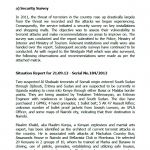
On Saturday, September 21, 2013, members of Al Shabaab, a Somali based Islamic terrorist organization affiliated with the international Al Qaeda network, executed a complex terrorist attack on an upscale shopping mall in Nairobi, Kenya. The attackers simultaneously entered the mall from two different entrances, shooting shoppers with assault rifles and throwing hand grenades. The terrorists remained in the mall, engaging government security forces for the next four days, resulting in a major fire and partial collapse of the mall. The Kenyan government has officially reported 72 deaths and more than 200 injured as a result of the attack. A significant number of those killed and injured were foreign citizens, including 6 U.S. citizens who were injured in the attack.

